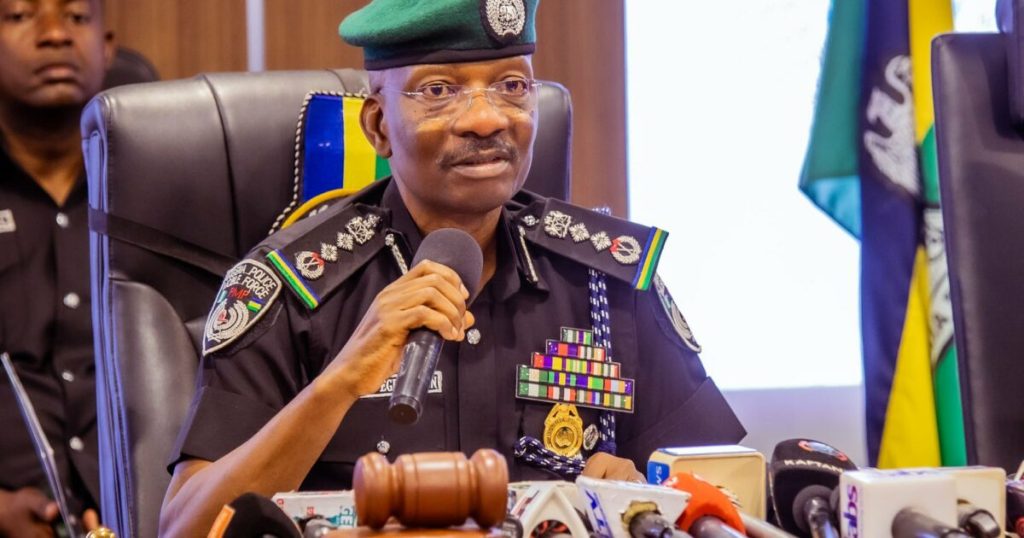Paragraph 1: The Debate on State Police in Nigeria
The issue of state police in Nigeria has sparked a contentious debate between the Inspector General of Police (IGP) and the Conference of Speakers of State Houses of Assembly. The IGP, Kayode Egbetokun, maintains that the existing centralized police force simply requires more funding to effectively address the country’s security challenges. Conversely, the Speakers, represented by their chairman, Debo Ogundoyin, advocate for a multi-layered policing system, incorporating state police forces alongside the federal force, mirroring models adopted in other nations. This clash of perspectives unfolded during a constitutional review legislative dialogue focused on Nigeria’s security architecture, highlighting the fundamental disagreement on how best to structure and empower law enforcement agencies to combat insecurity.
Paragraph 2: The IGP’s Argument for Maintaining Centralized Policing
The IGP’s position is rooted in existing constitutional provisions that establish a single, national police force under the authority of the President and the Police Council. He references Sections 214(1) and 215(1) of the 1999 Constitution, which underscore the centralized nature of policing in Nigeria. While acknowledging the arguments in favor of state police, such as localized responsiveness and quicker reaction times, Egbetokun expresses concerns about Nigeria’s preparedness for such a decentralized model. He argues that the country’s complex security landscape, characterized by insurgency, banditry, secessionist movements, and piracy, necessitates a unified and coordinated approach, which he believes is best achieved through a strengthened federal police force.
Paragraph 3: The IGP’s Concerns and Proposed Solutions
The IGP further elaborates on the challenges faced by the Nigerian Police Force, attributing them to constitutional omissions and ambiguities related to inter-agency collaboration, intelligence sharing, and the role of subsidiary policing frameworks. He highlights the lack of clear command structures in joint operations involving various security agencies, which can lead to jurisdictional disputes, diluted accountability, and delayed responses. Rather than establishing state police forces, Egbetokun proposes legislative reforms that focus on enhancing the capacity of the federal police while allowing for structured support from sub-national units under strict constitutional and operational guidelines. This, he argues, would provide a more effective and coordinated response to security threats.
Paragraph 4: The Speakers’ Push for Decentralized Policing
In contrast, the Conference of Speakers argues that a centralized police structure is inadequate to address the diverse security challenges faced by different states. They assert that state legislatures, being closer to the people, have a deeper understanding of the specific threats and vulnerabilities within their respective states. They advocate for state police forces as a way to enhance local responsiveness, improve intelligence gathering, and foster greater community engagement in security matters. This position is presented not merely as a political stance but as a "patriotic and strategic necessity" driven by the pressing need for more effective security measures.
Paragraph 5: Addressing Concerns and Expanding the Scope
Acknowledging concerns regarding potential abuse of power, capacity limitations, and inter-jurisdictional conflicts associated with state police, the Speakers emphasize their willingness to address these challenges. They underscore that the call for state police is a reflection of the collective will of the sub-national entities that constitute Nigeria. Beyond state policing, they also advocate for improved intelligence sharing, inter-agency coordination, increased funding for security personnel, and stronger legal frameworks to combat emerging threats like cybercrime and terrorism. They see this comprehensive approach as vital for ensuring the safety and security of all Nigerians.
Paragraph 6: The Core Disagreement and the Path Forward
The core disagreement between the IGP and the Speakers revolves around the fundamental structure of policing in Nigeria. The IGP favors a strengthened and better-funded centralized force, while the Speakers champion a decentralized model that empowers states to establish and manage their own police forces. This debate underscores the complex and multifaceted nature of security governance in Nigeria. Moving forward, resolving this impasse requires careful consideration of both perspectives, along with a thorough assessment of the potential benefits and risks associated with each approach. The constitutional review process provides an opportunity for a robust national dialogue that can lead to a more effective and responsive security architecture. Finding a solution that balances national unity and local autonomy will be crucial for ensuring the safety and security of all citizens.


